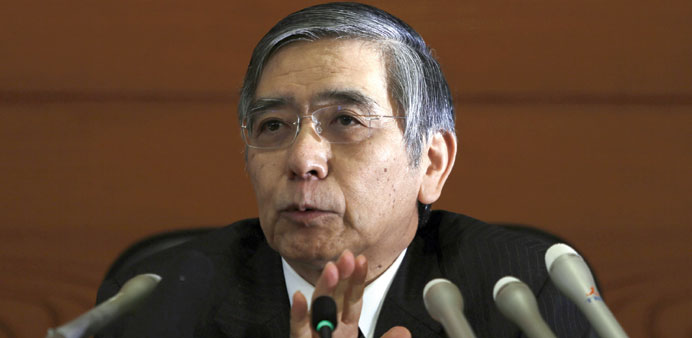Kuroda: Tightening job market will boost wages.
Reuters
Tokyo
The Bank of Japan’s former top economist said it should modify its stimulus programme to suit a protracted battle against deflation because companies will take much longer than expected to substantially raise wages.
The BoJ held off on expanding its “quantitative and qualitative easing” (QQE) programme last week even as it cut its rosy inflation forecasts, clinging to the hope a tightening job market will boost wages and help accelerate price growth. But Hideo Hayakawa, well-versed in the bank’s economic analysis and policy drafting, said companies were unlikely to raise basic wages next year any more than this year’s feeble 0.6% increase, given the murky economic outlook. The boost to inflation from a weak yen, which has pushed up imported food and grocery prices, will also peak by around the middle of next year, keeping inflation distant from the BoJ’s 2% target for years to come, he added.
“QQE is a programme typically designed to run for a short period of time. It was initially a success, shocking markets with a huge blow of stimulus,” said Hayakawa, now a senior analyst at the Fujitsu Research Institute think tank.
“With wages taking so long to rise and its tool kit nearly empty, the BoJ should shift to a policy designed for a prolonged fight” to boost inflation, he told Reuters yesterday.
Slow progress in structural reforms to boost Japan’s growth potential has made companies hesitant to invest in wages and capital goods, Hayakawa said. Labour unions, which had prioritised protecting jobs over winning wage hikes during 15 years of deflation, are slow in changing that approach. It was only after strong pressure by premier Shinzo Abe’s government that companies reluctantly agreed to a meagre rise in basic wages.
The jobless rate has fallen to 3.4% and the ratio of job offers to applicants has hit a two-decade high, though most are for temporary workers unaffected by wage hike negotiations. A labour ministry survey released on Wednesday showed the ratio of temporary workers in Japan’s total workforce reached 40% for the first time on record.
Nearly 40% of firms that replied said they are increasing temporary hiring to cut costs, suggesting that it will take time for tightening job markets to lead to higher wages.
Under QQE, the BoJ buys up roughly the same volume of government bonds as are issued each month to expand base money at an annual pace of ¥80tn ($659bn). But inflation has ground to a halt, and some of BoJ governor Haruhiko Kuroda’s fellow policymakers warn that maintaining let alone expanding the current rate of bond buying to encourage inflation could dry up liquidity and distort markets. Hayakawa, who is still influential among incumbent policymakers, said the BoJ should revert to a policy of targeting interest rates. That would relieve the BoJ from accelerating bond buying and allow it to maintain very accommodative monetary conditions just by keeping rates at zero, he said.

